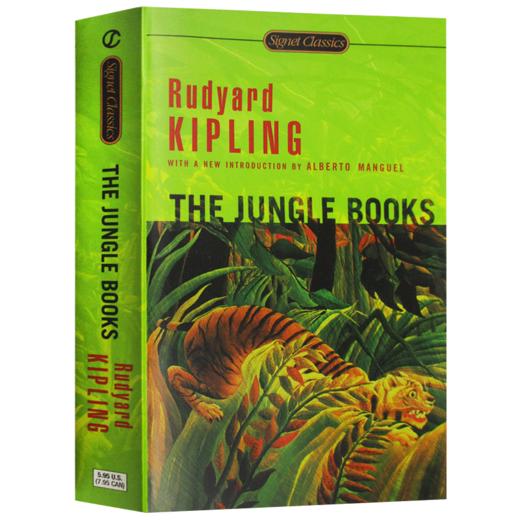丛林故事 英文原版 The Jungle Books 丛林之书 丛林日记 英文版 森林王子奇幻 电影原著 儿童文学经典书籍 正版进口英语书
| 运费: | ¥ 0.00-999.00 |
| 库存: | 36 件 |
商品详情
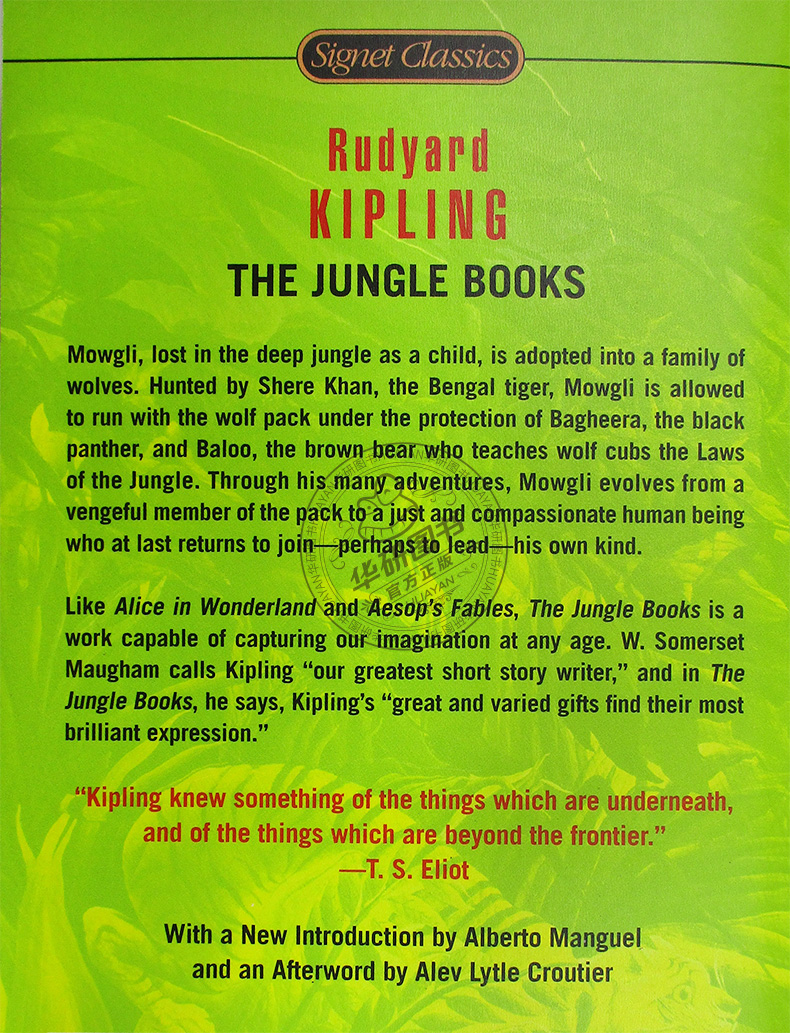
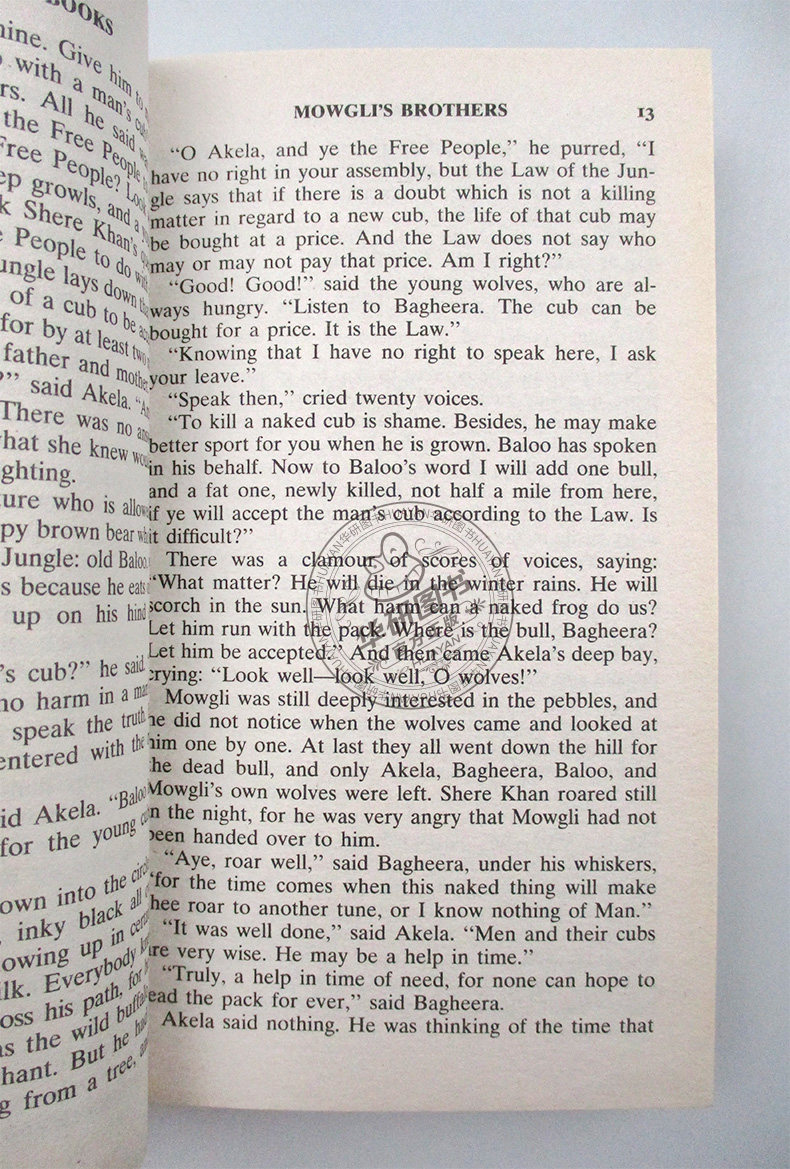
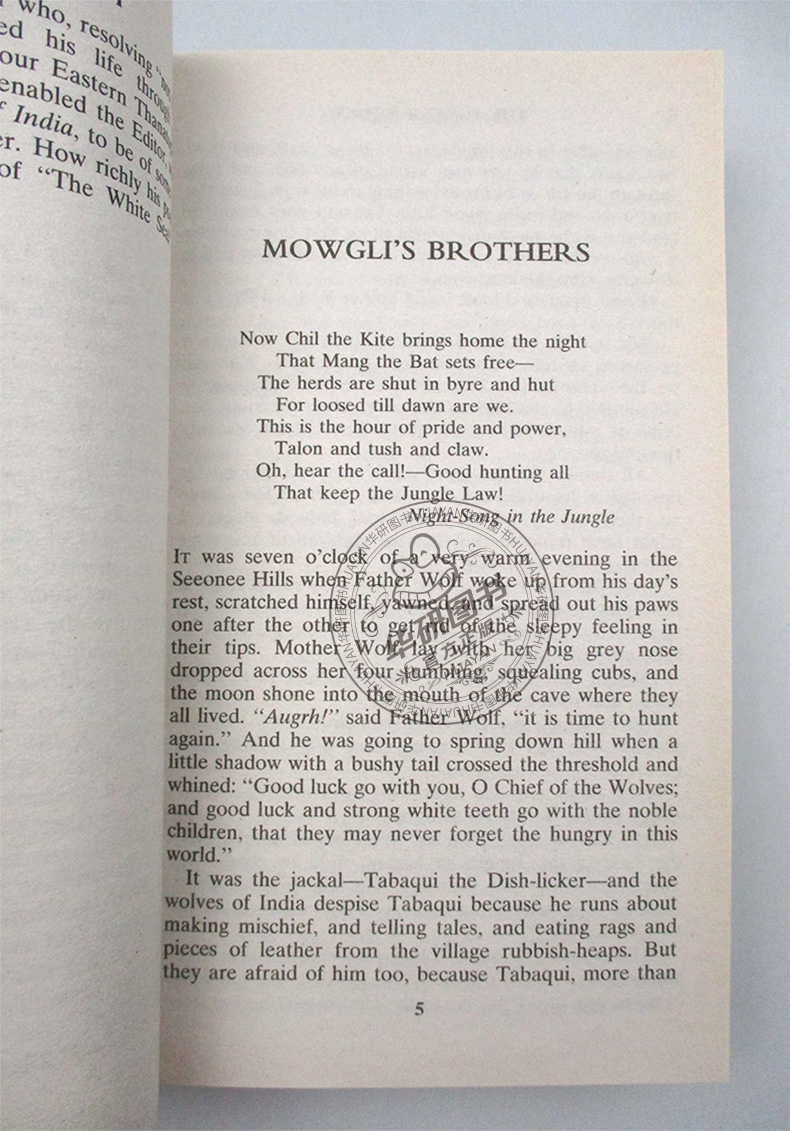
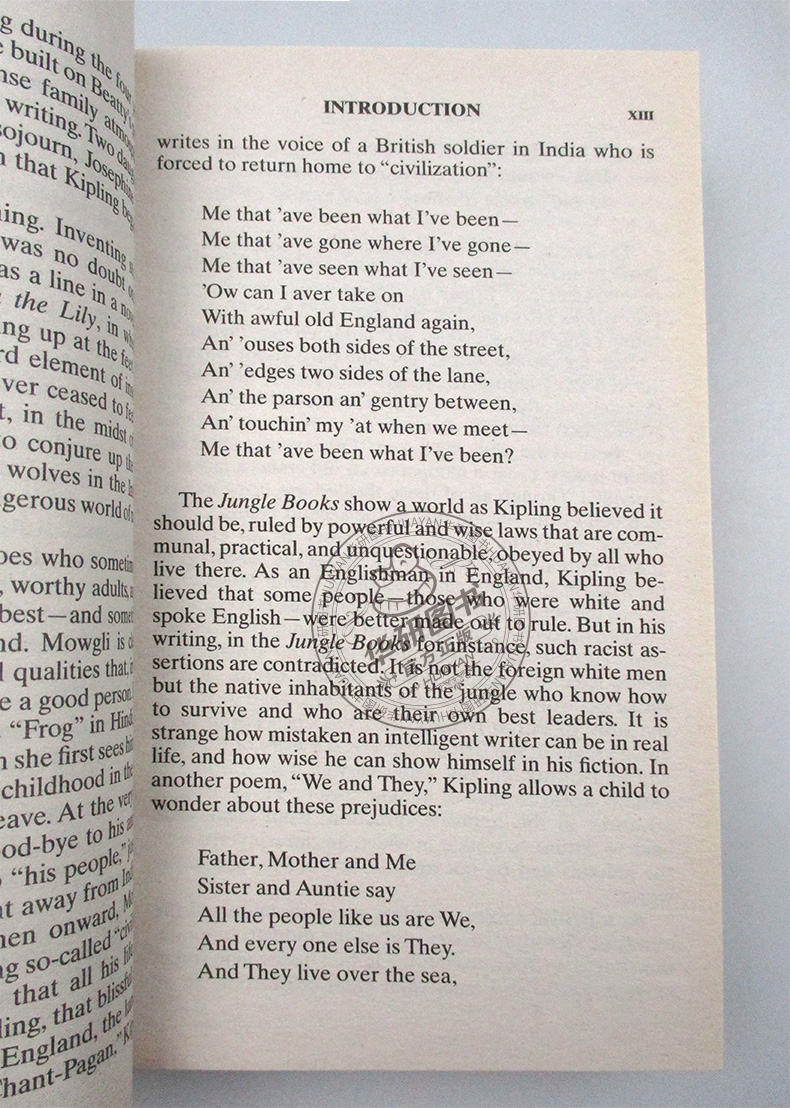

书名:The Jungle Books丛林之书/丛林日记/丛林故事
难度:Lexile蓝思阅读指数560L
作者:Rudyard Kipling拉迪亚德·吉卜林
出版社名称:Signet Classics
出版时间:2013
语种:英文
ISBN:9780451419187
商品尺寸:10.6 x 2.5 x 17.5 cm
包装:简装
页数:384 (以实物为准)

The Jungle Books《丛林之书》(也译为“丛林日记”“丛林故事”)是英国著名作家拉迪亚德·吉卜林的代表作,一百多年来被翻译成各种文字,广为流传,其也被公认为是世界儿童文学经典。我们熟知的动画电影《森林王子》和《奇幻森林》均取材于《丛林之书》。本书为Signet Classics推出的英文原版,包括The Jungle Book及其后续The Second Jungle Book两部分,内容完整无删减,书本轻巧便携。由Alberto Manguel作序,Alev Lytle Croutier后记。
“Kipling knew something of the things which are underneath, and of the things which are beyond the frontier.” —T. S. Eliot
Rudyard Kipling’s beloved collection of short stories about a boy raised by wolves who learns the Laws of the Jungle.
Mowgli, lost in the deep jungle as a child, is adopted into a family of wolves. Hunted by Shere Khan, the Bengal tiger, Mowgli is allowed to run with the wolf pack under the protection of Bagheera, the black panther, and Baloo, the brown bear who teaches wolf cubs the Laws of the Jungle. Through his many adventures, Mowgli evolves from a man-cub to a just and compassionate human being who at last returns to join—perhaps to lead—his own kind.
LikeAlice in Wonderland andAesop’s Fables,The Jungle Books is a workcapable of capturing our imagination at any age.W. Somerset Maugham calls Kipling “our greatest short story writer,” and in The Jungle Books, he says, Kipling’s “great and varied gifts find their most brilliant expression.”
With a New Introduction by Alberto Manguel and an Afterword by Alev Lytle Croutier

莫戈里是印度樵夫的儿子。当他还是个婴儿时,在森林里受到希尔·汗追逐,父母逃散,他误入狼穴,被母狼收养,成为狼群中的一员。他长成了一个勇武而又聪慧的少年。他的朋友有慈祥的狼妈妈,忠诚的狼兄弟,以及足智多谋的黑豹巴格希拉,憨厚的老熊巴鲁,正直的狼群头领阿克拉,孔武的蟒蛇卡阿。他们在莫戈里周围形成了一个温暖的集体,教给他生活的智慧和谋生的本领,教给他丛林动物必须遵守的“丛林法则”。老虎希尔·汗仍然不时前来捣乱。莫戈里具有人类的智慧,他从附近的村子里取来了动物们称之为“红花”的火,帮助阿克拉平息了狼群的叛乱,把煽动叛乱的老虎烧得焦头烂额,落荒而逃。后来,莫戈里被村子里一位失去儿子的村妇收养,当了放牛的牧童。但是老虎希尔·汗跟踪而来,要加害于他。莫戈里和狼兄弟们定下计策,利用牛群设下埋伏,希尔·汗陷进牛群的包围,被牛蹄践踏而死。但莫戈里也因冒犯村里的巫师而被村民用石子驱赶出来,回到了丛林……
The Jungle Book introduces Mowgli, the human foundling adopted by a family of wolves. It tells of the enmity between him and the tiger Shere Khan, who killed Mowgli’s parents, and of the friendship between the man-cub and Bagheera, the black panther, and Baloo, the sleepy brown bear, who instructs Mowgli in the Laws of the Jungle.The Second Jungle Book contains some of the most thrilling of the Mowgli stories. It includes Red Dog, in which Mowgli forms an unlikely alliance with the python Kaa, How Fear Came and Letting in the Jungle as well as The Spring Running, which brings Mowgli to manhood and the realisation that he must leave Bagheera, Baloo and his other friends for the world of man.

拉迪亚德·吉卜林(1865-1936),英国小说家、诗人。出生于印度孟买,父亲曾是孟买艺术学校教师,后任拉合尔艺术学校校长和博物馆馆长。吉卜林6岁时被送往英国,17岁中学毕业返回印度,担任拉合尔市《军民报》副编辑。他敏锐地观察印度的风土人情,把见闻写成小品文和轻快诗,发表在他为之工作的报纸上。1889年他返回英国,一年之内就被誉为当代杰出的散文作家之一。1892年结婚后他迁居美国,在美期间发表了《消失的光芒》《勇敢的船长们》和被认为是儿童文学经典作品的《基姆》《丛林之书》和《丛林之书续篇》。这些小说也被公认为是其较出色的作品。
吉卜林一生共创作了8部诗集,4部长篇小说,21部短篇小说集和历史故事集,以及大量散文、随笔、游记等。他的作品简洁凝练,充满异国情调。由于吉卜林的“观察的能力、新颖的想象、雄浑的思想和杰出的叙事才能”,于1907年获得诺贝尔文学奖,成为英国首位获此殊荣的作家。
Rudyard Kipling (1865–1936) was born in Bombay, the son of an Anglo-Indian professor of architectural sculpture. There he was brought up in the care of “ayahs,” or native nurses, who taught him Hindustani and the native lore that always haunted his imagination and can be seen reflected in The Jungle Books. At the age of six, he was sent to England. At twelve, he was sent to a school at Westward Ho!, the scene of Stalky & Co. In 1883, he returned to India and embarked on a career in journalism, writing the news stories as well as the tales and ballads that began to make his reputation. After seven years, he went back to England, the literary star of the hour. He married an American and stayed in Vermont off and on from 1892 to 1894. Then he returned to the English countryside, where he remained, except for a few trips abroad, for the rest of his life. The author of innumerable stories and poems, Rudyard Kipling is best known for Soldiers Three (1888), The Light That Failed (1890), The Jungle Books (1894–95), Captains Courageous (1897), Stalky & Co. (1899), Kim (1901), and Just So Stories(1902). Among many other honors, he received the Nobel Prize for Literature in 1907.
Alberto Manguel is a Canadian citizen born in Buenos Aires who settled in France. He is a member of the Canadian Writers’ Union, PEN, and a fellow of the Guggenheim Foundation, and he has been named an Officer of the French Order of Arts and Letters. He holds honorary doctorates from the University of Liège in Belgium and the Anglia Ruskin University, Cambridge, England. He has been the recipient of numerous prizes, including the Prix Médicis essay prize (France) for A History of Reading, the McKitterick prize (England) for his novel News from a Foreign Country Came, and the Grinzane Cavour prize (Italy) for A Reading Diary. He also won the Germán Sánchez Ruipérez Prize (Spain) and the Prix Roger Caillois prize (France) for the ensemble of his work, which has been translated into more than thirty languages.
Alev Lytle Croutier, whose books have been translated into twenty-one languages, is the only woman novelist from Turkey to be published extensively worldwide. She is the author of the international bestseller Harem: The World Behind the Veil, novels such as The Palace of Tears and Seven Houses and, for young readers, American Girl’s Leyla: The Black Tulip. The founding editor and editor-in-chief of Mercury House publishing company, she lectures frequently at universities, museums, and conferences.

INTRODUCTION
BOOK I
PREFACE TO BOOK I
MOWGLI’S BROTHERS
Hunting-Song of the Seeonee Pack
KAA’S HUNTING
Road-song of the Bandar-log
“TIGER-TIGER!”
Mowgli’s Song
The WHITE SEAL
Lukannon
“RIKKI-TIKKI-TAVI”
Darzee’s Chaunt
TOOMAI OF THE ELEPHANTS
Shiv and the Grasshopper
SERVANTS OF THE QUEEN
Parade-Song of the Camp-Animals
BOOK II
HOW FEAR CAME
The law of the Jungle
THE MIRACLE OF PURUN BHAGAT
A Song of Kabir
LETTING IN THE JUNGLE
Mowgli’s Song against People
THE UNDERTAKERS
A Ripple Song
THE KING’S ANKUS
The Song of the Little Hunter
QUIQUERN
Angutivun Tina
Red DOG
Chil’s Song
THE SPRING RUNNING
The Outsong

Mowgli’s Brothers
Now Rann the Kite brings home the night
That Mang the Bat sets free—
The herds are shut in byre and hut
For loosed till dawn are we.
This is the hour of pride and power,
Talon and tush and claw.
Oh, hear the call!—Good hunting all
That keep the Jungle Law!
Night-Song in the Jungle
It was seven o’clock of a very warm evening in the Seeonee hills when Father Wolf woke up from his day’s rest, scratched himself, yawned, and spread out his paws one after the other to get rid of the sleepy feeling in their tips. Mother Wolf lay with her big gray nose dropped across her four tumbling, squealing cubs, and the moon shone into the mouth of the cave where they all lived. “Augrh!” said Father Wolf. “It is time to hunt again.” He was going to spring down hill when a little shadow with a bushy tail crossed the threshold and whined: “Good luck go with you, O Chief of the Wolves. And good luck and strong white teeth go with noble children that they may never forget the hungry in this world.”
It was the jackal—Tabaqui, the Dish-licker—and the wolves of India despise Tabaqui because he runs about making mischief, and telling tales, and eating rags and pieces of leather from the village rubbish-heaps. But they are afraid of him too, because Tabaqui, more than anyone else in the jungle, is apt to go mad, and then he forgets that he was ever afraid of anyone, and runs through the forest biting everything in his way. Even the tiger runs and hides when little Tabaqui goes mad, for madness is the most disgraceful thing that can overtake a wild creature. We call it hydrophobia, but they call itdewanee—the madness— and run.
“Enter, then, and look,” said Father Wolf, stiffly; “but there is no food here.”
“For a wolf, no,” said Tabaqui; “but for so mean a person as myself a dry bone is a good feast. Who are we, the Gidur-log (the jackal people), to pick and choose?” He scuttled to the back of the cave, where he found the bone of a buck with some meat on it, and sat cracking the end merrily.
“All thanks for this good meal,” he said, licking his lips. “How beautiful are the noble children! How large are their eyes! And so young too! Indeed, indeed, I might have remembered that the children of kings are men from the beginning.”
Now, Tabaqui knew as well as anyone else that there is nothing so unlucky as to compliment children to their faces; and it pleased him to see Mother and Father Wolf look uncomfortable.
Tabaqui sat still, rejoicing in the mischief that he had made, and then he said spitefully:
“Shere Khan, the Big One, has shifted his hunting-grounds. He will hunt among these hills for the next moon, so he has told me.”
Shere Khan was the tiger who lived near the Waingunga River, twenty miles away.
“He has no right!” Father Wolf began angrily—“By the Law of the Jungle he has no right to change his quarters without due warning. He will frighten every head of game within ten miles, and I—I have to kill for two, these days.”
“His mother did not call him Lungri (the Lame One) for nothing,” said Mother Wolf, quietly. “He has been lame in one foot from his birth. That is why he has only killed cattle. Now the villagers of the Waingunga are angry with him, and he has come here to make our villagers angry. They will scour the jungle for him when he is far away, and we and our children must run when the grass is set alight. Indeed, we are very grateful to Shere Khan!”
“Shall I tell him of your gratitude?” said Tabaqui.
“Out!” snapped Father Wolf. “Out and hunt with thy master. Thou hast done harm enough for one night.”
“I go,” said Tabaqui, quietly. “Ye can hear Shere Khan below in the thickets. I might have saved myself the message.”
Father Wolf listened, and below in the valley that ran down to a little river, he heard the dry, angry, snarly, singsong whine of a tiger who has caught nothing and does not care if all the jungle knows it.
“The fool!” said Father Wolf. “To begin a night’s work with that noise! Does he think that our buck are like his fat Waingunga bullocks?”
“H’sh. It is neither bullock nor buck he hunts tonight,” said Mother Wolf. “It is Man.” The whine had changed to a sort of humming purr that seemed to come from every quarter of the compass. It was the noise that bewilders woodcutters and gipsies sleeping in the open, and makes them run sometimes into the very mouth of the tiger.
“Man!” said Father Wolf, showing all his white teeth. “Faugh! Are there not enough beetles and frogs in the tanks that he must eat Man, and on our ground too!”
The Law of the Jungle, which never orders anything without a reason, forbids every beast to eat Man except when he is killing to show his children how to kill, and then he must hunt outside the hunting-grounds of his pack or tribe. The real reason for this is that man-killing means, sooner or later, the arrival of white men on elephants, with guns, and hundreds of brown men with gongs and rockets and torches. Then everybody in the jungle suffers. The reason the beasts give among themselves is that Man is the weakest and most defenseless of all living things, and it is unsportsmanlike to touch him. They say too—and it is true—that man-eaters become mangy, and lose their teeth.
- 华研外语批发分销官方旗舰店 (微信公众号认证)
- 本店是“华研外语”品牌商自营店,全国所有“华研外语”、“华研教育”品牌图书都是我司出版发行的,本店为华研官方源头出货,所有图书均为正规正版,拥有实惠与正版的保障!!!
- 扫描二维码,访问我们的微信店铺
- 随时随地的购物、客服咨询、查询订单和物流...

